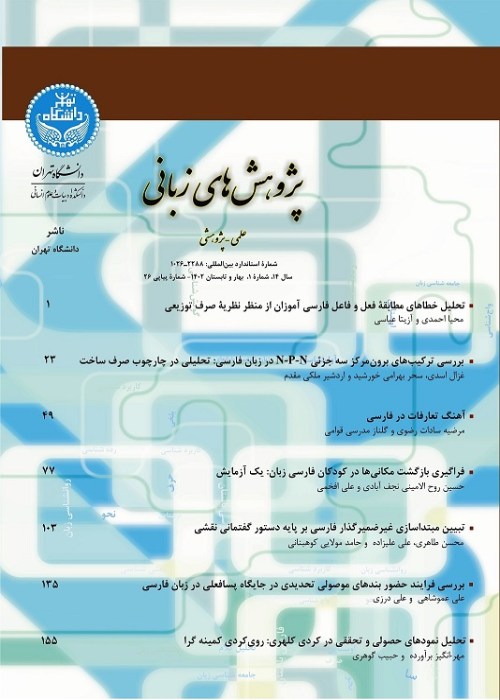Critical Analysis of Bargaining
Author(s):
Article Type:
Research/Original Article (دارای رتبه معتبر)
Abstract:
Discourse analysis examines the impacts of human, gender and cultural interactions and social values on discourse, and studies the way these relationships are presented in the text. Hence, in this article, which deals with the phenomenon of bargaining in an Iranian culture, Kermanshah, the approach of critical discourse analysis is used to study the discourse of bargaining regarding the mind control process of the audience. According to Foucault, power has a non-predetermined structure, hence because of its elusive nature, participants in a discourse can play different roles. This research data is gathered utilizing a questionnaire (164) and recording some conversations (850 minutes), in three different social class areas in Kermanshah. The analysis of the data shows that discourse participants use different linguistic mechanisms to reach their goals in bargaining, such as topicalization, short single sentences, exclamatory, imperative and interrogative structures, besides prosodic prominence strategies such as changes in stress, intonation and juncture which can end in shifts in the focus of the information structure of the sentences. However, simple words with ideological connotative meanings have the highest frequency. Moreover, according to the findings, three highlighted behavorial strategies frequent in bargaining include the usage of religious beliefs, having ethnic tradition biases, and stating economic, social, and class problems. The results indicate that the various roles pertaining to the bargaining participants –buyers and sellers- put bargaining in the category of reverse discourse, as Foucault calls it. The seller, in the power hierarchy, is the superordinate through the ownership position, while the buyer is the subordinate. However, in mind controlling, the buyer’s attempt to control the seller secretly makes them the controller, the one who applies power in a bottom-up order. Given that it is impossible to control the seller's mind without persuading them or without changing their worldview, bargaining is categorized as a rhetorical task, and the buyer, in this discourse, is the rhetor.
Keywords:
Language:
Persian
Published:
Language Research, Volume:10 Issue: 2, 2020
Pages:
171 to 192
magiran.com/p2115067
دانلود و مطالعه متن این مقاله با یکی از روشهای زیر امکان پذیر است:
اشتراک شخصی
با عضویت و پرداخت آنلاین حق اشتراک یکساله به مبلغ 1,390,000ريال میتوانید 70 عنوان مطلب دانلود کنید!
اشتراک سازمانی
به کتابخانه دانشگاه یا محل کار خود پیشنهاد کنید تا اشتراک سازمانی این پایگاه را برای دسترسی نامحدود همه کاربران به متن مطالب تهیه نمایند!
توجه!
- حق عضویت دریافتی صرف حمایت از نشریات عضو و نگهداری، تکمیل و توسعه مگیران میشود.
- پرداخت حق اشتراک و دانلود مقالات اجازه بازنشر آن در سایر رسانههای چاپی و دیجیتال را به کاربر نمیدهد.
دسترسی سراسری کاربران دانشگاه پیام نور!
اعضای هیئت علمی و دانشجویان دانشگاه پیام نور در سراسر کشور، در صورت ثبت نام با ایمیل دانشگاهی، تا پایان فروردین ماه 1403 به مقالات سایت دسترسی خواهند داشت!
In order to view content subscription is required
Personal subscription
Subscribe magiran.com for 70 € euros via PayPal and download 70 articles during a year.
Organization subscription
Please contact us to subscribe your university or library for unlimited access!


